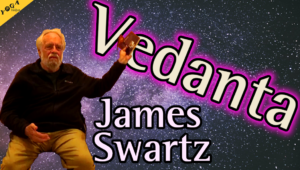Free will. Making no choice and turning it over to ishvara.
Issue of free will: what values are determining your use of
free will? Those values are chosen by the gunas. If tamas
predominates fear will inform your choices. If rajas
predominates desire will inform your choices. The self has
no values. It is value-neutral. Reincarnation view: this
person will transmigrate and will be the same person in the
next incarnation. The person‘s karma is coming along with
them. But: when the body goes this person is never coming
back. The only thing that transcends time are the subtle and
the causal body. The circumstances of the next birth will be
different. You will have a new identity. The person that you
think you are is a conceptual person, no actual person. You
claim that subjective and objective events equal ‚I‘.
Transmigration: What reincarnates is the subtle body
powered by the vasanas. Your parents will be selected by
ishvara according to your vasanas. Non-eternal jiva. Eternal
jiva is consciousness. It is the same ‚I‘ for everyone and it is
eternal. Irrelevance of the personal story and the
experiences of the person when you know your nature. ISense
is an image or a reflection of the I. The reflection is
not the Self. Vedanta is a complete teaching. Since we are
multi faceted people we need to understand the self from
different angles. 360 ° knowledge of the self and the world.
Verse 51: „The essential nature of pure love of God is
beyond description.“ But you can know it. Verse 52: “Trying
to describe the experience of pure love of God is like a
mute trying to describe a particular taste.” Verse 53:
„Occasionally, pure love of God is revealed in a qualified
person.” In great souls you find this kind of love that is
totally different from worldly love. Verse 54: “Pure love of
God is devoid of material qualities and desires, manifests
more and more every moment, is uninterrupted and is
always experienced as one’s innermost consciousness.”
Verse 55 “Having discovered non-dual love, you see only
the self everywhere, hear the self in every word, speak only
of the self and think only of the self.” You can discover love
but you can‘t make it happen. You get rid of your concepts
and discover that you are love. The gunas influence the way
you experience love. Then it is love conditioned by the
gunas. Verse 56 “Secondary devotional service is of three
kinds, according to which of the gunas predominates at any
time or according to the motivation – distress, desire or
knowledge – that brings one to devotion.” Verse 57: “Each
succeeding type of devotee is superior to the preceding
type.” Rajasic devotees are superior to tamasic devotees,
sattvic devotees are superior to rajasic devotees and nondual
devotees are superior to sattvic devotees. You need
rajas to get out of tamas. Tamas means you live in a fantasy
world. In rajas you are driven by ambition. You need sattva
and knowledge to get out of rajas. Self inquiry renders the
gunas non binding, so you can overcome attachment to
sattva.

Podcast: Play in new window | Download
Subscribe:








